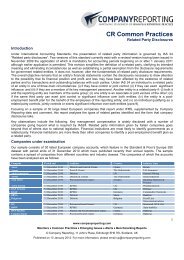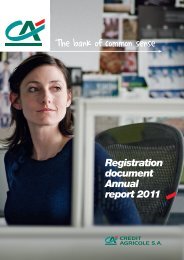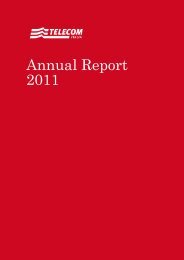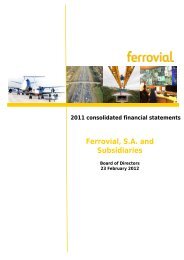BP Annual Report and Form 20-F 2011 - Company Reporting
BP Annual Report and Form 20-F 2011 - Company Reporting
BP Annual Report and Form 20-F 2011 - Company Reporting
- No tags were found...
You also want an ePaper? Increase the reach of your titles
YUMPU automatically turns print PDFs into web optimized ePapers that Google loves.
Corporate governanceThe Act requires a director of a company who is in any way interested ina contract or proposed contract with the company to declare the natureof the director’s interest at a meeting of the directors of the company.The definition of ‘interest’ includes the interests of spouses, children,companies <strong>and</strong> trusts. The Act also requires that a director must avoid asituation where a director has, or could have, a direct or indirect interestthat conflicts, or possibly may conflict, with the company’s interests. TheAct allows directors of public companies to authorize such conflicts whereappropriate, if a company’s Articles of Association so permit. <strong>BP</strong>’s Articlesof Association permit the authorization of such conflicts. The directors mayexercise all the powers of the company to borrow money, except that theamount remaining undischarged of all moneys borrowed by the companyshall not, without approval of the shareholders, exceed the amount paidup on the share capital plus the aggregate of the amount of the capital <strong>and</strong>revenue reserves of the company. Variation of the borrowing power of theboard may only be affected by amending the Articles of Association.Remuneration of non-executive directors shall be determined in theaggregate by resolution of the shareholders. Remuneration of executivedirectors is determined by the remuneration committee. This committee ismade up of non-executive directors only. There is no requirement of shareownership for a director’s qualification.Dividend rights; other rights to share in company profits; capital callsIf recommended by the directors of <strong>BP</strong>, <strong>BP</strong> shareholders may, byresolution, declare dividends but no such dividend may be declared inexcess of the amount recommended by the directors. The directors mayalso pay interim dividends without obtaining shareholder approval. Nodividend may be paid other than out of profits available for distribution,as determined under IFRS <strong>and</strong> the Act. Dividends on ordinary shares arepayable only after payment of dividends on <strong>BP</strong> preference shares. Anydividend unclaimed after a period of 12 years from the date of declarationof such dividend shall be forfeited <strong>and</strong> reverts to <strong>BP</strong>.The directors have the power to declare <strong>and</strong> pay dividends in anycurrency provided that a sterling equivalent is announced. It is not thecompany’s intention to change its current policy of paying dividends in USdollars.At the company’s AGM held on 15 April <strong>20</strong>10, shareholdersapproved the introduction of a Scrip Dividend Programme (Programme) <strong>and</strong>to include provisions in the Articles of Association to enable the companyto operate the Programme. The Programme enables ordinary shareholders<strong>and</strong> <strong>BP</strong> ADS holders to elect to receive new fully paid ordinary shares (or<strong>BP</strong> ADSs in the case of <strong>BP</strong> ADS holders) instead of cash. The operationof the Programme is always subject to the directors’ decision to makethe scrip offer available in respect of any particular dividend. Should thedirectors decide not to offer the scrip in respect of any particular dividend,cash will automatically be paid instead.Apart from shareholders’ rights to share in <strong>BP</strong>’s profits by dividend(if any is declared or announced), the Articles of Association provide thatthe directors may set aside:• A special reserve fund out of the balance of profits each year to make upany deficit of cumulative dividend on the <strong>BP</strong> preference shares.• A general reserve out of the balance of profits each year, which shallbe applicable for any purpose to which the profits of the companymay properly be applied. This may include capitalization of such sum,pursuant to an ordinary shareholders’ resolution, <strong>and</strong> distribution toshareholders as if it were distributed by way of a dividend on theordinary shares or in paying up in full unissued ordinary shares forallotment <strong>and</strong> distribution as bonus shares.Any such sums so deposited may be distributed in accordance with themanner of distribution of dividends as described above.Holders of shares are not subject to calls on capital by thecompany, provided that the amounts required to be paid on issue havebeen paid off. All shares are fully paid.Voting rightsThe Articles of Association of the company provide that voting onresolutions at a shareholders’ meeting will be decided on a poll other thanresolutions of a procedural nature, which may be decided on a show ofh<strong>and</strong>s. If voting is on a poll, every shareholder who is present in personor by proxy has one vote for every ordinary share held <strong>and</strong> two votes forevery £5 in nominal amount of <strong>BP</strong> preference shares held. If voting ison a show of h<strong>and</strong>s, each shareholder who is present at the meeting inperson or whose duly appointed proxy is present in person will have onevote, regardless of the number of shares held, unless a poll is requested.Shareholders do not have cumulative voting rights.Holders of record of ordinary shares may appoint a proxy, includinga beneficial owner of those shares, to attend, speak <strong>and</strong> vote on theirbehalf at any shareholders’ meeting.Record holders of <strong>BP</strong> ADSs are also entitled to attend, speak<strong>and</strong> vote at any shareholders’ meeting of <strong>BP</strong> by the appointment by theapproved depositary, JPMorgan Chase Bank N.A., of them as proxies inrespect of the ordinary shares represented by their ADSs. Each such proxymay also appoint a proxy. Alternatively, holders of <strong>BP</strong> ADSs are entitled tovote by supplying their voting instructions to the depositary, who will votethe ordinary shares represented by their ADSs in accordance with theirinstructions.Proxies may be delivered electronically.Matters are transacted at shareholders’ meetings by the proposing<strong>and</strong> passing of resolutions, of which there are two types: ordinary orspecial. An annual general meeting must be held once in every year.An ordinary resolution requires the affirmative vote of a majority ofthe votes of those persons voting at a meeting at which there is a quorum.A special resolution requires the affirmative vote of not less than threefourthsof the persons voting at a meeting at which there is a quorum. AnyAGM requires 21 days’ notice. The notice period for a general meeting is14 days subject to the company obtaining annual shareholder approval,failing which, a 21-day notice period will apply.Liquidation rights; redemption provisionsIn the event of a liquidation of <strong>BP</strong>, after payment of all liabilities <strong>and</strong>applicable deductions under UK laws <strong>and</strong> subject to the payment ofsecured creditors, the holders of <strong>BP</strong> preference shares would be entitledto the sum of (i) the capital paid up on such shares plus, (ii) accrued <strong>and</strong>unpaid dividends <strong>and</strong> (iii) a premium equal to the higher of (a) 10% of thecapital paid up on the <strong>BP</strong> preference shares <strong>and</strong> (b) the excess of theaverage market price over par value of such shares on the LSE during theprevious six months. The remaining assets (if any) would be divided prorata among the holders of ordinary shares.Without prejudice to any special rights previously conferred onthe holders of any class of shares, <strong>BP</strong> may issue any share with suchpreferred, deferred or other special rights, or subject to such restrictions asthe shareholders by resolution determine (or, in the absence of any suchresolutions, by determination of the directors), <strong>and</strong> may issue shares thatare to be or may be redeemed.Variation of rightsThe rights attached to any class of shares may be varied with the consentin writing of holders of 75% of the shares of that class or on the adoptionof a special resolution passed at a separate meeting of the holders of theshares of that class. At every such separate meeting, all of the provisionsof the Articles of Association relating to proceedings at a general meetingapply, except that the quorum with respect to a meeting to change therights attached to the preference shares is 10% or more of the shares ofthat class, <strong>and</strong> the quorum to change the rights attached to the ordinaryshares is one-third or more of the shares of that class.Corporate governance<strong>BP</strong> <strong>Annual</strong> <strong>Report</strong> <strong>and</strong> <strong>Form</strong> <strong>20</strong>-F <strong>20</strong>11 137










